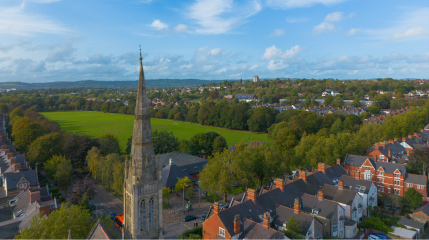
House prices in the UK increased just 2.6% on average last year
 According to mortgage lender Nationwide, house prices across the UK increased just 2.6% on average during 2017, while house prices in London reportedly fell for the first time in eight years.
According to mortgage lender Nationwide, house prices across the UK increased just 2.6% on average during 2017, while house prices in London reportedly fell for the first time in eight years.
This comes following an average increase of 4.5% in 2016 and has proved the slowest rate of annual growth since 2012, with households feeling constrained by falling real pay. This has resulted in many families growing increasingly reluctant to commit to any major spending decisions.
House price growth predicted to slow to 1-1.5%
Nationwide predict that house price growth is likely to slow even further throughout 2018, estimating around 1-1.5%, due to subdued economic growth across the country and a continued strain on the financial situation for many families. We recently wrote about Rightmove predicting the same small increase in UK property prices over the next 12 months.
In December, the average price of a home in the UK was £211,156, and prices rose by 0.6% over the course of the month.
Houses in Wales experienced slightly better increase than most
When splitting the country into regions, Wales experienced a slightly stronger price increase than the majority of the UK in 2017, with an average house price increase of 3.3%, though this was still 1.2% down on the average UK house price from the previous year. At the other end of the scale, London was the only region in the UK to experience a decrease in the average house value, with prices decreasing by 0.5%, making the English capital the weakest performing region since 2004.
For many, affordability has become extremely challenging, with people either being priced out of the market, or needing to find lenders who are willing to borrow them a greater multiple of their income.
Robert Gardner, chief economist at Nationwide, said it would take almost 10 years for a typical buyer in London to save for a deposit, with the average property price standing at £470,922 by the end of 2017.
The biggest increase in 2017 was in the West Midlands, with average house prices rising by 5.2% to £182,861. This was followed by the south-west, where the prices typically increased by 4.8% to £239,576.
Outlook for the housing market remains uncertain
Nationwide claim low mortgage rates, high employment levels and a shortage of properties on the current market had prevented a bigger slowdown in the growth of UK house prices in 2017. The lenders say the outlook for the housing market in 2018 is uncertain and will depend on the outcome of Brexit talks, as well as the UK’s overall economic performance.
Gardner went on to say that in recent years, the UK housing market has been characterised by significant regional disparities in house prices, and how Brexit will impact these dynamics remains unclear.
One thing that is clear according to Howard Archer, chief economic adviser to the EY Item Club forecasting group, is the fact that 2018 is likely to be a very challenging year for the housing market, partly because homebuyers will be concerned by potentially higher mortgage costs, after the Bank of England raised interest rates for the first time in a decade towards the end of 2017, and indicated that further increases were likely.
The team here at CPS Homes estate agents are experts at helping people buy and sell properties. Whether you’re a first-time buyer, looking to move up the property ladder, or simply hoping to add to your portfolio, our property services are here to help. Find out more by getting in touch with us today. You can reach us by calling 02920 668585, emailing enquiries@cpshomes.co.uk, or by popping into one of three Cardiff branches.
The information contained within this article was correct at the date of publishing and is not guaranteed to remain correct in the present day.


